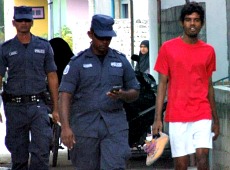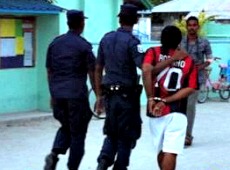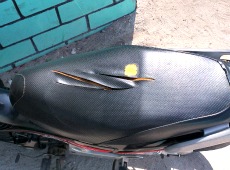Government civil servants are still working to create functional waste management systems despite numerous failed projects nationwide and a lack of ministerial collaboration.
Establishing a national waste management system is dependent on the success of a US$6.5 million pilot program implemented by the Ministry of Housing and Environment.
Ahmed Nizam, Solid Waste Management Coordinator for the project, told Minivan News that construction of one system on the uninhabited island of Vandhoo in Raa Atoll will hopefully be completed by late 2013 and the system should be operational by the beginning of 2014.
Nizam explained, “This differs from previous projects because it is holistic, sustainable, and state of the art. It is a regional waste management system that includes everything – community awareness, equipment, infrastructure, transportation, and processing – whereas previous projects lacked in one or more of these areas.”
The World Bank funded Maldives Environmental Management Project (MEMP) will cover four northern atolls – Noonu, Raa, Baa, and Lhaviyani – and plans to process 52 tons of waste daily for 45 inhabited islands (over 7000 households), 15 operational resorts, 15 resorts in development, and nine industrial islands.
“The Vandhoo processing system has been engineered by a German company and meets European standards. The World bank would only provide funds to a properly functioning facility,” Nizam stated.
The processing facility on Vandhoo differs from previous waste management endeavors in that it has learned from the horrific failures of Thilafushi. There will be controlled incineration and no open burning, mixed waste, or land reclamation using trash.
Instead, composting of organic waste – which accounts for 70 percent of trash volume – will be dealt with at the island level, while the incinerated ash that cannot be reused for making bricks will be landfilled in “cells” that prevent chemical leaching into groundwater.
“Thilafushi is not what we want. The current conditions there pose serious health and safety threats to Bangladeshi workers living there and those toxins spread to Male’ and Villingili as well.
“The citizens of Raa atoll have expressed concerns the Vandhoo site will be another Thilafushi and we have gone to great lengths to ensure that will not happen,” Nizam added.
Although recyclables will be separated, there will be no facilities on Vandhoo to process them. Currently, the only alternative is to sell to neighboring countries.
However, there are plans to convert heat produced from the incinerators using a “donkey boiler” into electricity.
Nizam also explained to Minivan News that current government policy dictates waste must be brought to the nearest designated processing facility.
In practice, this “proximity principle” means that waste from the northern atolls can be transported to Vandhoo instead of Thilafushi.
“With only two transport vessels for this regional system we lack the capacity to expand transportation to the northern-most atolls. However, there is a possibility the transportation network can expanded in the future,” Nizam stated.
Depending on the success of this pilot program and access to development funds, regional centers are planned to be built throughout the country. In the interim, transporting waste to Vandhoo island will serve as a stop-gap measure.
A waste tracking system is included in this regional system, which will monitor how much garbage is being sent by resorts and matching this against what is received on Vandhoo, to discourage dumping into the sea by rogue garbage contractors trying to avoid fuel bills.
To further ensure the project’s sustainability, island councils in the region as well as civil society organisations are partnering with the MEMP to educate islanders through community-based awareness programs.
“Resort fees and household fees will cover operational costs, so this regional system will not be dependent on government funds. However, the government has the option to subsidize fees for islanders,” Nizam said.
The newly created state utilities company Fenaka Corporation Ltd will run the Vandhoo operations.
MEMP is currently negotiating with civil works contractors to develop Vandhoo infrastructure.
Past failures and current shortcomings
Establishing waste management systems on the islands has been an ongoing struggle.
Most islands have waste areas that vary in quality and have no means of processing or removing trash from the garbage areas.
Nizam explained that after the 2004 tsunami the United Nations (UN), Canadian and Australian Red Cross built infrastructure and provided equipment for some islands, however no island level program plans or systems were put in place.
A more wide-scale failure was the European Union (EU)-supported Ari Atoll waste management program.
“All the studies were completed and islands were provided infrastructure and equipment, however funding was withdrawn [for a regional processing facility] because the government-proposed equipment was deemed too expensive and no regulations were established,” according to Nizam.
Former President Mohamed Nasheed’s government attempted to correct the problem but could not secure funds, or establish sustainable public private partnerships due to political polarisation fueling a lack of island council support, he added.
Currently, under the EU and Australia Aid funded Climate Change Trust Fund (CCTF), a pilot program is being launched to support waste management development on five Ari atoll islands and one waste transfer vessel that will bring garbage to Thilafushi, Nizam further explained.
Correcting the mismanagement of Thilafushi remains a work in progress.
The previous government under Nasheed had signed a waste management agreement with India-based Tatva Global Renewable Energy back in May 2011 to implement a system designed to generate power from recycling waste.
The contract has been undergoing renegotiation with the current government as part of efforts to provide what it has called a more “mutually beneficial” agreement – a move slammed by the Male’ City Council (MCC), which accused authorities of trying to “sabotage” the deal.
Meanwhile the Ministry of Tourism, Arts and Culture has pledged to take the “lead” in addressing waste management issues in Male’ should the city’s council and the Ministry of Environment and Energy fail to effectively deal with concerns about garbage.
There are no regulations or laws for waste management, only the Environmental Protection Act, however the Environmental Protection Agency is in the “final stages” of completing regulations and should be releasing them within the next few weeks, according to Nizam.
Is civil society filling the gap?
The opinion of many islanders is that since there is no way to process or remove the waste, there is no point in not littering.
Imad Mohamed, Executive Director of Huvadhoo Aid (HAD), told Minivan News about some of the projects and related challenges this non-governmental organization (NGO) has encountered regarding waste management and environmental conservation.
Huvahdoo Aid’s main focus in this area is helping other NGOs throughout the region develop community-based waste management plans.
“However, last year HAD tried to construct waste management center on Hoadedhdhoo island in collaboration with the Male’-based NGO Community Aid, funded by the Mangroves for the Future (MMF) program. We also had a partnership agreement with a neighboring resort that was willing to donate an incinerator.
“However, the Hoadedhdhoo Island Council claimed that they did not want HAD to build the [waste management] centre, because it is ‘mandated’ that the island council should run the centre,” according to Imad.
A source from the partnering resort explained that they were excited to donate the incinerator to HAD, assist with installation, and even modify it to create hot water free of change.
“It had been sitting on our dock for five months rusting,” the source explained.
However, logistics to transport the incinerator could not be arranged.
The incinerator has now been given to a different island in the atoll.
The Hoadedhdhoo Island Council did not respond to calls at the time of press.
Resorts going it alone
Resorts are aiming for “self-sufficiency” when it comes to waste management, since there are no regional centres in operation.
While there are tourism regulations that require certain waste management systems are constructed on resorts, they are only inspected once constructed, Nizam told Minivan News.
“Facilities are not properly used, are very costly, and some resorts claim tourists do not want to see waste burning,” he said.
Whether resorts adopt sustainable, environmentally-friendly practices is de facto voluntary.
Some are motivated by the need to maintain an eco-friendly reputation and sell the Maldives as a “premium [vacation] destination” that is also “environmentally sensitive,” a resort manager told Minivan News.
Their resort is “trying to do the right thing” and has developed a waste management system that has reduced 70 percent of their waste.
“Thilafushi is just wrong. We have reduced our trips there from seven per week to one,” the source stated.
The resort also conducts training for staff and their Maldivian team has “embraced” these environmentally friendly practices, the manager claimed.
Likes (0)Dislikes
(0)Dislikes (0)
(0)
 (0)Dislikes
(0)Dislikes (0)
(0)

